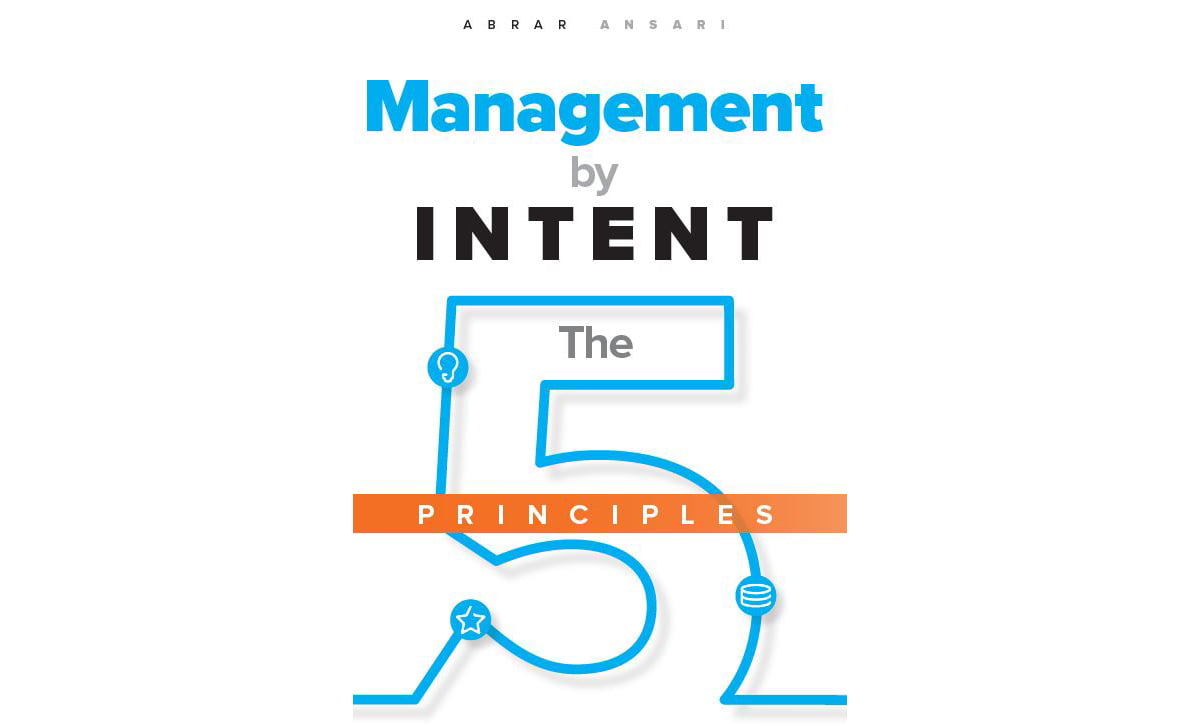Excerpted from Management by INTENT, the 5 Principles, by Abrar Ansari, published by Abstract-space Inc., Copyright © 2020 by Abrar Ansari. All rights reserved.
Q3 2021 hedge fund letters, conferences and more
IT IS THE character of the leadership that shapes the organization’s value system, just like the tenacity and the intensity of the wind that shapes the dunes in the desert. But in spite of the sheer strength of the winds, the essence of the dunes remains the same: sand. In order to change the essence of sand, and transform the desert itself, water is needed. What water is to desert, intent is to character.
The MBI Principles
If a leader’s character is grounded in an ethical and moral code of conduct, infused with a deep understanding of the MBI Principles, the end result leads to clarity of purpose, and outcomes that are tied to safeguarding the general public interest of all. I started this quest by helping my clients achieve meaningful results. It has culminated in the formulation of the MBI Principles. Over the course of my career, I have confronted the consequences of my actions, and forced myself to re-evaluate how genuinely aligned I was to living the principles outlined in this book.
As I evaluated and examined myself, by assessing my strategy and culture, I found that using the filters of life, dignity, reason, wealth, and the future helped me redress my path. It eventually led me to develop my consulting practice based on the MBI Principles. With this book, I aim to pay it forward.
When the MBI Principles are applied justly throughout the corporate decision-making process, they have the potential to become a driving force in refocusing an organization’s mindset from short-term quarterly earnings into a broader and more balanced growth strategy; one dedicated to the cause of preventing harm and promoting good.
Over the course of my consulting career, I have met many exceptional leaders, yet few embody MBI Principles in its totality. I frequently get calls from senior executives who have been directed by their boards to find practical solutions to the ever-increasing onslaught of stakeholder demands; for a more robust plan of action regarding Environmental, Social and Governance (ESG) behavior.
Jumping On The Sustainability Bandwagon
As many CEOs jump on the sustainability bandwagon, hoping to find answers to pacify their shareholders, I give them this good-hearted advice: “Only focusing on tactical disclosure strategies is not going to cut it.” That would be similar to simply slowing down your speed when you spot a cop. It is not just about obeying the law and not getting caught, but rather saving the lives of those in the car. Similarly, disclosing ESG policies and performance improvement statistics to pacify investors is not going to redress the root of the problem.
A vast percentage of the workforce, especially the younger generation, is growing wary of what our free enterprise system has evolved into. To rebalance the derailed free enterprise system, we need our leaders to be driven by a higher-level of consciousness; whereby they undertake sincere self-reflection to rebalance their own psyche, so that they attain the right wisdom, courage and temperance in dealing with some fundamental organizational and operational issues, redressing the rise in extreme inequity, resource scarcity, climate change, waste and pollution, destruction of ecosystems, and the loss of biodiversity.
I firmly believe that corporations can be a force of good for society. We already see many successful examples outlined throughout the chapters, such as Chobani and Patagonia.
There are signs of many other businesses wanting to start anew as well. At the 2020 World Economic Forum in Davos, the central theme echoing through the halls was the urgent need for business leaders to take up stakeholder capitalism. The need for companies to invest in their workers, while taking care of their customers, supporting their communities, and protecting the planet, has never been more pronounced.
MBI enables this agenda of change. It can be implemented by taking baby steps towards a future of principled inclusion that safeguards life, preserves dignity, upholds reason, protects wealth, and safeguards future generations.
Engendering a balance in capitalism will require recalibrating organizational intent. That goal requires a deep commitment to both behavioral psychological, and structural level reformation. It necessitates profound transformational changes to the status quo business models, product portfolios, and practices across all enterprises. PepsiCo’s PwP transformational initiative discussed in Chapter Two, took former CEO Nooyi and her team 10 years to implement. Such transformations are massive efforts designed to systematically realign the entire organization to its purpose. Even Wall Street is taking notice. It is no surprise that asset management firms such as BlackRock, a Wall Street powerhouse and holder of seven trillion dollars in global funds, is advancing an agenda of corporate sustainability and investment stewardship.
About the Author
As a Certified Management Consultant (CMC), Abrar Ansari has worked with Fortune 500 company executives serving a diversified portfolio of clients in energy, petrochemical, pharmaceutical, manufacturing, and agribusiness sectors for over 29 years. His career has been anchored in providing thought leadership and coaching in the areas of operational excellence, governance and risk management, strategy, and ESG. As a business strategist, mentor, and coach, he focuses on guiding his clients in designing, communicating, and executing incremental transformational change initiatives. He is an expert in aligning organizational goals and objectives to purposeful outcomes generating holistic value for his clients. Abrar is a skilled public speaker with the ability to capture audience attention and keep them engaged.













